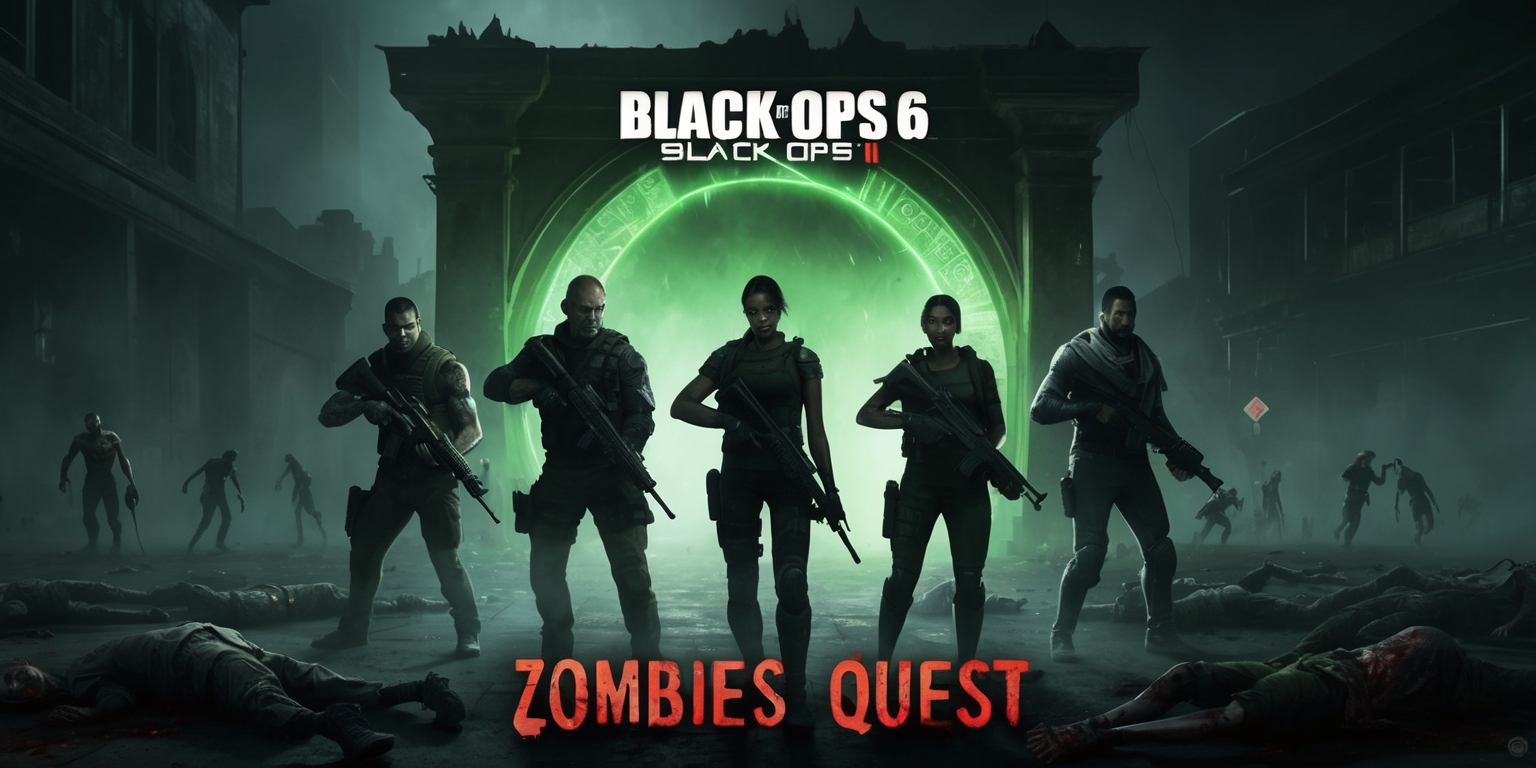Harmonic Reverberations: Uncovering the Shattered Veil Music Easter Egg in Black Ops 6 Zombies
- 282

The digital realm of Black Ops 6 Zombies holds enigmas that engage players beyond traditional gameplay challenges. Within this eerie landscape, hidden musical cues await the curious explorer. One such secret is the Shattered Veil Music Easter Egg, which invites players to unearth concealed headphones and trigger an evocative tune that augments the in-game experience. The design of this secret quest seamlessly blends exploration with interactive audio elements, offering an enticing diversion from standard combat and survival pursuits. As players navigate dim corridors and secret chambers, every step brings them closer to a soundscape that complements the narrative framework and heightens the atmosphere of the map.
Decoding the Quest's Objective
The heart of the quest lies in discovering three distinct pairs of headphones associated with the enigmatic Mister Peeks. Each pair serves as a key to unlocking an immersive tune, the carefully orchestrated anthem "Falling to Pieces" by Kevin Sherwood and Malukah. Locating these items involves keen observation and knowledge of the map’s layout. Players must use their interaction button—Square on PlayStation, X on Xbox, and F on PC—to activate each item, ensuring that every discovery is acknowledged with a crisp sound effect. The systematic approach in which these objectives are laid out reflects the game’s layered design philosophy, where each minor detail contributes to unlocking a more extensive narrative hidden beneath the surface of the chaos and mystery.
Exploring the Conservatory Secrets
The Conservatory presents the first treasure in the quest for a hidden melody. In this secluded area, exploration is rewarded by finding a pair of headphones ingeniously concealed on a box beneath a staircase. The environment of the Conservatory is designed with intricate detail, evoking an atmosphere where decay meets elegance. Subtle visual cues hint at the presence of hidden objects, encouraging players to scrutinize every nook and cranny. The arrangement of items and architecture not only supports the narrative backdrop but also reinforces the idea that each secret is meticulously embedded in the environment. Without overt signposting, the design nudges players toward cautious yet persistent exploration, turning every movement into an expectation of revelation.
Unveiling the Banquet Hall Mystery
Continuing the auditory adventure, players make their way to the Banquet Hall, where the second pair of headphones awaits discovery. Positioned atop a radio on a lower shelf in a discreet corner behind the elevator, the item transforms a mundane environment into a puzzle waiting to be solved. The Banquet Hall is imbued with a sense of grandeur and subtle decay, where the remnants of luxurious gatherings now serve as a backdrop for clandestine endeavors. The placement of the headphone on a shelf behind essential map structures portrays an interweaving of daily routines with hidden lore. Every element in this room, from the antique décor to the confined spaces, contributes to the layered narrative that rewards those who choose to look beyond the obvious.
Navigating the Service Tunnel Challenge

Deep within the Service Tunnel lies the final element of this harmonious mystery. Here, the third pair of headphones waits on a shelf to the right of a wall offering essential upgrades for body armor. The tunnel is a labyrinth of industrial decay, where flickering lights and narrow passages add to the tension of exploration. The environment transforms the act of searching into a nerve-wracking yet engaging mission. With the discovery of this last pair, the conditions are met for the secret tune to emerge. This area, brimming with tactile details and immersive set dressing, embodies the perfect culmination point in the quest. Every movement is a careful balance between urgency and precision, further enhancing the immersive experience.
Integrating Interactive Game Mechanics
The activation of the music easter egg is an exemplary demonstration of the game’s ability to blend interactive elements with storytelling. Players are encouraged to actively engage with their surroundings, using specific interaction commands to trigger audio cues embedded in the environment. This mechanic ensures that exploration is not simply a passive endeavor; rather, it involves active engagement that rewards attentive action. The requirement of noticing distinct locations, such as under boxes or atop radios, underscores the significance of environmental storytelling. It urges players to approach every area with a mindset that even everyday objects may hold the key to unlocking deeper lore. The process not only advances gameplay but also enhances the overall narrative by interlinking the tangible landscape with a hidden, sound-driven story arc.
Immersive Audio and Visual Synergy
The harmony between the music and visuals in Black Ops 6 Zombies is particularly striking in the context of the Shattered Veil quest. As the hidden music easter egg is activated, the song "Falling to Pieces" floods the environment with an evocative soundscape, enriching the ambiance of the map. The carefully composed instrumentals and stirring vocals are designed to resonate with the game’s grim aesthetic, injecting a newfound energy into the chaotic surroundings. The acoustic design is intricately tied to the map’s enigmatic atmosphere, ensuring that the musical cues feel both organic and unexpected. The coupling of refined audio production with meticulously crafted set pieces creates an experience that is as much about appreciating fine art as it is about surviving a relentless undead onslaught.
Spatial Design and Environmental Cues
Every map in Black Ops 6 Zombies is a study in narrative space, and Shattered Veil stands as a testament to thoughtful layout and environmental cues. The careful placement of Mr. Peeks’ headphones in distinct areas such as the Conservatory, Banquet Hall, and Service Tunnel emphasizes the interconnected nature of map design and storytelling. Each location is steeped in its own distinct ambiance, from the echoing corridors of the Conservatory to the dimly lit industrial corridors of the Service Tunnel. The spatial arrangement is far from being just a simple setting, it plays an essential role in shaping the narrative, encouraging players to exploit both vertical and horizontal dimensions of the environment. This clever integration of space and function serves as a reminder that in every corner of the game, history and mystery await those who choose to explore.
Player Engagement Through Exploration
Among the most striking qualities of the Shattered Veil quest is how it leverages exploration serving as a mechanism for fostering more profound interaction. Instead of relying solely on combat, the quest rewards players for their inquisitive spirit and a sharp eye for detail. The act of discovering each pair of headphones is meaningful, reinforcing the idea that exploration is an essential part of surviving and thriving in this digital landscape. The quest’s design encourages players to balance caution with curiosity, driving them to meticulously inspect every area for hidden details. This emphasis on exploration fosters a deeper connection with the story and the setting, as players become active participants in unraveling the labyrinth of secrets that the map offers, each discovery unfolding new layers of intrigue and wonder.
Interactive Challenges and Timing Considerations
The timing involved in the activation of the music track adds an additional layer of strategy to the experience. The quest is structured in such a way that once the final pair of headphones is activated and the song begins, the opportunity to trigger the sequence again in that cycle is permanently lost until a future playthrough. This design choice introduces an important consideration in gameplay: the importance of timing and readiness. Players must carefully consider when the best time is to engage fully with the quest, balancing the excitement of hearing the full tune against the potential risk of missing out on other objectives. It transforms the quest into a calculated exercise where each decision has a permanent impact on the immediate gaming experience, reflecting a blend of immediacy and long-term strategy.
Subtle Narrative Threads and Lore Integration
Beyond mere mechanics, the integration of this musical puzzle weaves subtle narrative threads into the broader lore of Black Ops 6 Zombies. The appearance of Mr. Peeks’ headphones hints at a backstory that is both mysterious and interconnected with the overarching narrative of the map. Details such as the placement of objects, the ambient sounds, and the references to iconic tunes all contribute to an immersive lore that exists just beneath the surface of the action. Through these carefully crafted elements, players experience a deeper thematic resonance that transforms a simple quest into an intricate tapestry of folklore and mystery. This approach enriches the world-building, providing layers of meaning that reward observant players with a sense of participation in a larger, unfolding story.
Experiential Depth and Dynamic Storytelling
Each element of the Shattered Veil quest contributes to a dynamic storytelling experience that blurs the lines between gameplay and narrative exploration. The quest is not simply about ticking off objectives but about experiencing the interconnected evolution of sound, space, and lore. As players methodically trigger each stage of the easter egg, they become immersed in a sequence "that is equally breathtaking in its visual appeal" acoustically captivating. The dynamic interplay of interactive elements and environmental storytelling fosters a unique gameplay rhythm, where every element contributes to an overall sensory narrative. This depth encourages even seasoned players to re-examine familiar maps with a renewed sense of discovery that lies hidden behind every shadow and artifact in the game world.
